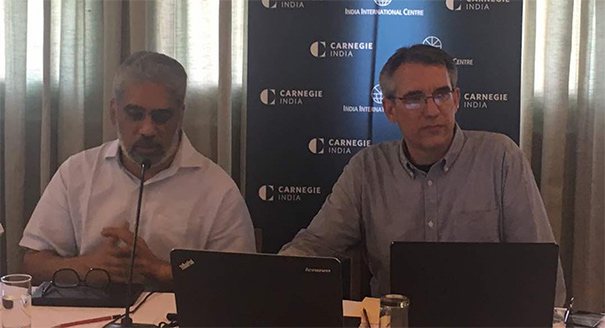Registration
Thank you!
You will receive an email confirming your registration.
Inside the tightly controlled society of North Korea, the demise of state socialism, creeping market forces, and an increased social openness to the outside world is altering the country. Carnegie India, in association with Indian International Center, hosted Tim Sullivan, the Asia correspondent for the Associated Press, for a roundtable discussion on North Korea.
DISCUSSION HIGHLIGHTS
- The Paradox of North Korea: Discussants examined the difficulties in developing an independent perspective on North Korea, which they ascribed to a lack of reliable information and sources. Participants noted that the reality of life in North Korea has always been hard to figure out due to the state’s control over the media. At the same time, discussants noted that the image created by the international media about North Korea, as a country with crumbling economy, state propaganda, and militarism, does not capture the entire story. Participants emphasized that North Korean society is slowly transforming.
- Changing Society: The growing market economy is slowly transforming North Korea, discussants said. They highlighted the role played by the unofficial markets through which people smuggle goods into the country, mostly through porous Chinese borders. They drew attention to how information was seeping into North Korea along with the foreign goods. Participants also observed that in an essentially male-dominated society, women are playing an increasingly important role. However, they noted that the probability of these economic and societal changes leading to political change is low. Participants contended that the absence of political dialogue or action in the country even after the famine of the 1990s shows that the citizens’ belief on the ultimate authority of one family is deeply ingrained.
- The Nuclear Question: Discussants stressed that North Korea’s nuclear threats should not be underestimated or ignored. Underscoring that North Korea’s nuclear program impacts the security architecture in the international arena, participants described the urgent need to address the security threat. There are, participants noted, two diametrically opposed groups when it comes to the nuclear program: the optimists, who believe in engagement with Pyongyang and hope to convince it to abandon its nuclear program, and the pessimists, who wish to exert intense diplomatic pressure toward denuclearization. Participants were of the opinion that North Korea’s instinct for self-preservation, and the leading regime’s fear of losing its power if it were to give up the nuclear program, could be the reason the nation is avoiding engagement with the international community.
- China’s Role: Participants agreed that China, due to the fear of having a political crisis close to home, will seek to engender stability in the region and make sure that North Korea does not collapse. The economic and political interdependency between both the countries makes it difficult for them to sever relations, participants observed.
- Geopolitical Drivers: Participants observed that a number of factors are causing tensions in the region to rise, including the U.S. Terminal High Altitude Area Defense installation in South Korea, President Trump’s willingness to meet with Kim Jong-un, China’s hardening stance on North Korea, Japanese militarization, and Pyongyang’s repeated defiance of international community’s warnings. They expressed their concern that the nuclear question may not be resolved without destabilizing the Korean peninsula’s geopolitical landscape.
This event summary was prepared by Soundarya Jayaraman, an intern at Carnegie India.
